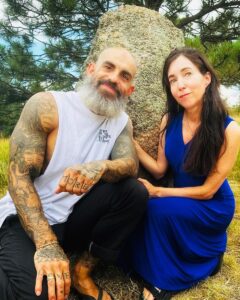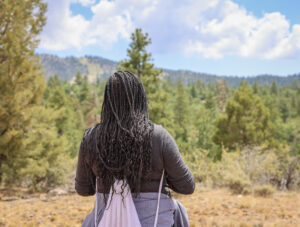Awake in the New Year
With Deborah Eden Tull and Enrique Collazo
December 30, 2024 - January 4, 2025
A Dharma & Dance Retreat
The New Year is a powerful threshold. Buddhist traditions have long emphasized the importance of setting clear and conscious intentions in our spiritual life and engagement in the world. In this New Year’s retreat you will be invited to listen deeply, reflect, restore, and create new possibilities. You will be guided through a unique journey of embodiment – bridging dharma and dance, stillness and motion, personal and collective awakening.
Registration closes December 23rd at 11:59pm Pacific Time
Grounded in Buddhism and acknowledging the gravity of the times we face, we will seek to cultivate compassion, clear-seeing, and possibility through meditation and dance/conscious movement practice, mindful inquiry, dharma talks, relational mindfulness, and deep time in nature. This retreat will be held in a container of silence, while our time in group will include music, voice, speaking from the heart, and conscious community.
In our time together, we will compassionately explore such questions as:
- What are my deepest intentions for the year ahead, for my life, and for our world in this age of global change?
- What lessons and hidden gems are there to harvest from 2024?
- What obstacles or limiting beliefs is it time to acknowledge, release, let go, and forgive – personally and on behalf of our collective? How do we truly let go of limiting beliefs?
- What is emerging through me and what is my practice in response to changes in my life and in our world?
- How can I fully engage the source of my deepest power and my peace?
- And how can my dharma practice support me in cultivating greater balance and personal sustainability in my life?
The transition to a New Year beckons with possibility and renewal. If we open to this invitation with wonder, curiosity, and courage, we can touch into wise-hearted guidance within and also the embrace and support of the entire cosmos. All are welcome; experienced meditators and those new to practice, and experienced dancers and those new to movement/embodiment practice.
Cost:
*retreat fees below guarantee a room type, however if space is available guests will automatically be upgraded room types, when possible*
*retreat fees include teacher compensation*
Are finances a barrier to attend? We strive to make retreats as accessible as possible to anyone. Contact us if finances are a burden in any way, we have several options to make these retreats financially accessible to you. We ask that these be prioritized for those who self-identify as BIPOC, hold marginalized identities, or in financial need. Contact us at guestservices@bigbearretreatcenter.org for more information.
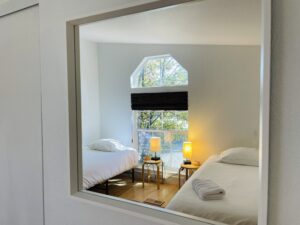
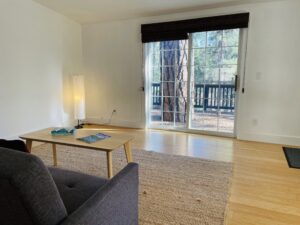
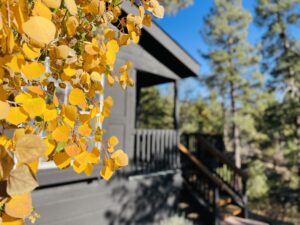
Accommodations:
The Center consists of several single-story buildings and cabins for dining, meditation and sleeping. Our residence cabins are large furnished and comfortable with 3-4 bedrooms and 2 bathrooms, living rooms, a full kitchen and decks outside in nature for shared use. Our residential cabins and rooms are simply furnished with a balance of comfort and simplicity. All beds are twin, and all bedding is provided by the center.
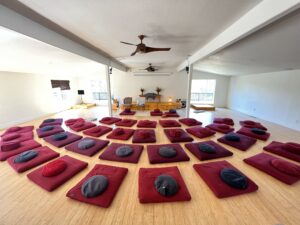
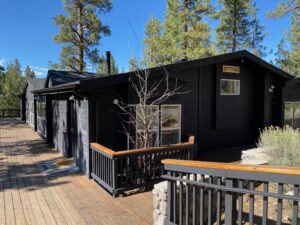
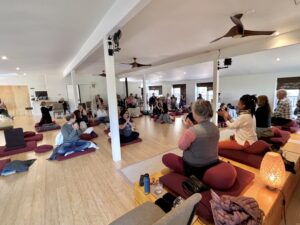
The Meditation Hall:
Our beautiful meditation hall is a large room that accommodates most meditation and movement retreats. We have supplies for most participants, but guests are always welcome to bring their own supplies (not required). Guests can typically expect to have access to a zabutan (large cushion), zafu (small cushion), yoga mat, blocks, a meditation chair, a blanket and a selection of other yoga and meditation props with limited supplies. If you’re unsure, please contact us or visit our welcome guide for more details.

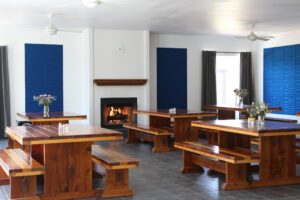

Meals:
The Center provides fresh, healthy meals made with seasonal and organic ingredients to support a nourishing time in retreat. Meals begin with dinner on arrival evening through to breakfast on departure morning. For this retreat, meals will be offered to support meditation retreat practice with a simple medium breakfast, hearty lunch, and light dinner (typically soup and salad). All meals will be vegetarian, and we accommodate most major dietary restrictions. Snacks will be available in the dining hall 24/7, including teas and coffees. The Center has refrigerators in the cabins and dining area for guests to store their own snacks – please bring any foods that might support your time here.
Work Meditation:
This retreat will include a daily work meditation service period, or “yogi jobs”, around 30-minutes a day. This is an opportunity to practice in service of community and bring your practice into daily roles at the center. If you have mobility or health concerns please reach out and we will find alternative accommodations. More details and a sign up sheet will be shared at registration.
Planning your trip:
If you are booking a flight for your trip our recommendation is to search for flights to the Ontario Airport (ONT) whenever possible. If your travel plans require you to land at the Los Angeles International Airport (LAX) we highly recommend arriving at least one day prior to your arrival at BBRC for retreat. Registration opens on Arrival day from 2:00pm – 4:00pm. Most retreats close by noon or later on departure day so please allow yourself adequate time for travel to the airport. Please visit our Getting to Big Bear page on our website for more detailed travel recommendations.
Ride-share:
Ride-sharing / Carpooling is highly encouraged, and is one of the most convenient ways to travel to Big Bear Retreat Center. For this retreat we have set up a self-organized ride-share page that you can visit at anytime before, we will send email reminders closer to the retreat. Visit the ride-share page
Covid Policies:
For this retreat we are requiring a proof of a negative rapid test on arrival day for all yogis, teachers and staff. A re-test will be required on the third day by dinner. Masking and vaccines are optional.
Guests are asked, when possible, to bring their own rapid tests or test before travel on arrival day. Tests will be provided by the center by request only.
For any questions please contact guestservices@bigbearretreatcenter.org or visit our website bigbearretreatcenter.org
Cancellation Policy:
Please visit our website for more on the cancellation policy for this retreat- bigbearretreatcenter.org/cancellation-policy
- > 8 weeks $100
- 4-8 weeks $175
- 2-4 weeks $300
- <2 weeks No Refunds
Scholarship and Financial Support Cancellation Fee Policy:
- > 8 weeks $75
- 4-8 weeks $150
- < 4 weeks No Refunds
Frequently Asked Questions about this retreat
What is conscious dance? What does it have to do with meditation/Buddhist practice?
Conscious dance is an extension of our stillness practice. It’s mindfulness of movement. The Buddha in his instructions encouraged us to practice in all bodily functions. Standing, sitting, lying down and in motion. He encouraged us to bring wise attention to every aspect of our lives. In stillness meditation, we have the opportunity to observe the mind and body at rest through silent introspection. In the dance we engage in mindfulness while in motion.
Conscious dance helps us to integrate our meditation practice into the dynamic movement of everyday life, and our engagement with all of life. Dance is an invitation to remember the play, spontaneity, and creativity that comes from living in the moment. It’s an opportunity to get out of our heads and travel beyond the realm of concepts and ideas, allowing our bodies to guide us to take new shapes beyond conditioned stories/beliefs/habits.
Do I have to be an experienced meditator to join this retreat? Do I have to be a dancer?
No. All that is required is an open mind and an open heart. All you need is beginner’s mind, curiosity and the willingness to show up and try on practices you may have not engaged in before. Both meditation and movement are pathways for remembering who and what we really are. Willingness is the key.
The invitation is to let go of any conditioned ideas you may hold about dance. It’s not about performing. It’s not about being good or bad, better or worse. It’s about presence, freedom, and embodiment.
What if I have limited physical ability?
This is not a problem. Both sitting meditation and dance can be made accessible to all bodies. Rather than setting standards for how we sit/move our bodies, we listen to the guidance of our bodies in both sitting meditation and dance. You can sit on a chair, cushion, or even practice lying down if you have physical challenges. You can dance sitting, standing, or even practice lying down. All bodies and abilities are welcome.
Is this a traditional silent retreat? Non-traditional?
This retreat bridges tradition with creative innovation and an experiential post-patriarchal teaching style. This retreat is held in a container of sacred silence – no socializing, silent meals, and silent time in nature to support each person’s practice. In the meditation hall, however, we will offer both traditional activities such as meditation and dharma talks, as well as less traditional practices like relational mindfulness (in partners in small groups), facilitated group discussion, reflective writing, and conscious dance. This is an opportunity to bring our practice off the cushion into how we relate so that we can see that there is no need to separate these two things. There will be plenty of time for silence.
What is relational mindfulness practice?
All dharma practice is relational. The relationship to ourselves and the conditions that arise inside of us and outside, like with the people around us, and to the greater world.
It’s the practice of using mindfulness to support authentic empathetic connections.
We will also be drawing upon the practices and 9 principles from Eden’s book Relational Mindfulness: A Handbook for Deepening Our Connection with Ourself, Each Other, and Our Planet. (Wisdom 2018)
Is this retreat appropriate for both introverts and extroverts?
Yes, folks who identify as either or (abiaverts) will have an opportunity to grow and take care of themselves in turn. All are welcome!
What is the significance of setting conscious intentions for the new year within Buddhism?
There is deep significance to how we spend the New Year within Buddhism. Zen Buddhism teaches that how we spend that time of transition from one year to the next sets the tone for the entire year ahead. On this retreat we will be guiding a process of conscious intention setting that came directly from Eden’s time at a silent Zen Buddhist monastery. She began doing this process 25 years ago for her life, and it has evolved into an emergent inquiry and reflective process that she guides every single year on retreat. This year, Enrique is joining in and bringing his unique medicine to the mix.
In Enrique’s words, My goal is to do everything continuously and with intention. I don’t. But that’s my intention every day. And I bet my day is a whole lot more pleasant when I do that. Mindfulness is really good at changing habits, but I have to practice. If I don’t practice setting intentions/goals I will continue to do what I always do, be pushed around by what I like and and what I don’t like. I’ll get distracted.
About the Teachers & Facilitators
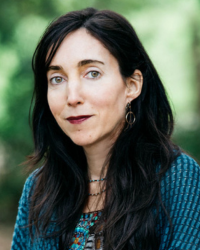
Deborah Eden Tull
Deborah Eden Tull is a Zen meditation/mindfulness teacher, author, spiritual activist and sustainability educator. She spent seven years as a monastic at a silent Zen Monastery, and has been immersed in sustainable communities for 25 years. Eden’s teaching style is grounded in compassionate awareness, non-duality, mindful inquiry, and an unwavering commitment to personal transformation. She […]
Learn more about Deborah Eden Tull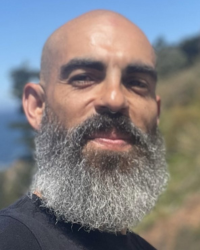
Enrique Collazo
Enrique Collazo is a compassionate and contemporary Mindfulness Meditation teacher rooted in the Buddhist Vipassana tradition since 2005. His practice, founded in the principles of Insight Meditation, extends to empowering people of all ages in Los Angeles and the Bay Area through daylongs, workshops, and classes since 2009. Enrique is well-loved and respected for his […]
Learn more about Enrique CollazoCategories : Meditation, Open Reg, Silent Retreat

